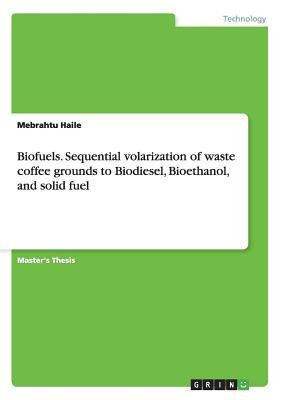
- We will send in 10–14 business days.
- Author: Mebrahtu Haile
- Publisher: GRIN Verlag
- Year: 2014
- Pages: 104
- ISBN-10: 365666210X
- ISBN-13: 9783656662105
- Format: 14.8 x 21 x 0.6 cm, softcover
- Language: English
- SAVE -10% with code: EXTRA
Biofuels. Sequential volarization of waste coffee grounds to Biodiesel, Bioethanol, and solid fuel (e-book) (used book) | bookbook.eu
Reviews
Description
Master's Thesis from the year 2014 in the subject Energy Sciences, course: Biofuels, language: English, abstract: In this study, the utilization of waste coffee residue for biodiesel production, its solid byproduct after oil extraction for bioethanol production, as well as the second byproduct after bioethanol production for solid fuel and compost production was investigated. For the study, waste coffee residue sample was collected from TOMOCA PLC, Addis Ababa, Ethiopia. The oil was then extracted using n-hexane and resulted in oil yield of 19.73 %w/w. The biodiesel was obtained by a two-step process, i.e. acid catalyzed esterification followed by base catalyzed transesterification using catalysts sulfuric acid and sodium hydroxide respectively. The conversion, after esterification of waste coffee residue oil in to biodiesel, was about 80.4%. Various parameters that are essential for biodiesel quality were evaluated using the American Standard for Testing Material (ASTM D 6751- 09). The results obtained for kinematic viscosity (5.3 mm²/s), carbon residue (0.033%), flash point (222°C), ash content (0.0123%), water and sediment (
EXTRA 10 % discount with code: EXTRA
The promotion ends in 18d.13:35:11
The discount code is valid when purchasing from 10 €. Discounts do not stack.
- Author: Mebrahtu Haile
- Publisher: GRIN Verlag
- Year: 2014
- Pages: 104
- ISBN-10: 365666210X
- ISBN-13: 9783656662105
- Format: 14.8 x 21 x 0.6 cm, softcover
- Language: English English
Master's Thesis from the year 2014 in the subject Energy Sciences, course: Biofuels, language: English, abstract: In this study, the utilization of waste coffee residue for biodiesel production, its solid byproduct after oil extraction for bioethanol production, as well as the second byproduct after bioethanol production for solid fuel and compost production was investigated. For the study, waste coffee residue sample was collected from TOMOCA PLC, Addis Ababa, Ethiopia. The oil was then extracted using n-hexane and resulted in oil yield of 19.73 %w/w. The biodiesel was obtained by a two-step process, i.e. acid catalyzed esterification followed by base catalyzed transesterification using catalysts sulfuric acid and sodium hydroxide respectively. The conversion, after esterification of waste coffee residue oil in to biodiesel, was about 80.4%. Various parameters that are essential for biodiesel quality were evaluated using the American Standard for Testing Material (ASTM D 6751- 09). The results obtained for kinematic viscosity (5.3 mm²/s), carbon residue (0.033%), flash point (222°C), ash content (0.0123%), water and sediment (


Reviews